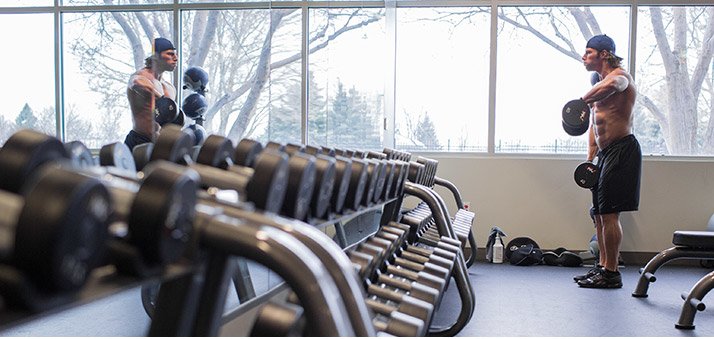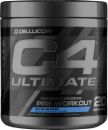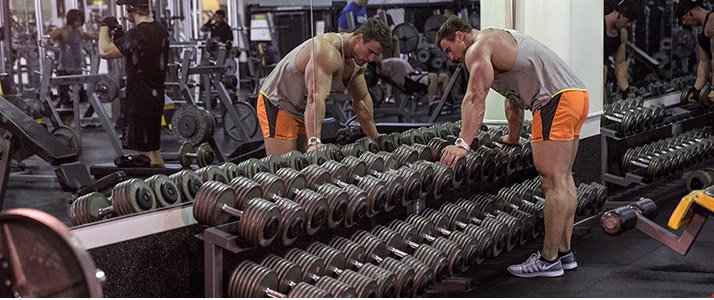
8 Bad Habits That Could Wreck Your Fitness Goals
Don't let these 8 bad habits derail your fitness journey! Stay on the gains train by learning how to steer clear of these common roadblocks with help from the pros.
To obtain a truly great physique, every move you make in the gym should be purposeful, and every workout should build on your previous efforts. A lackluster warm-up and a few minutes spent chatting between sets might not seem like much, but these practices add up. Develop one bad habit, compound it over time, and you could see potential results slip through your fingers.
If you want to crush your goals and stay on the road to positive results, you have to avoid the many bad habits scattered across the fitness landscape, no matter how small. Luckily, the elite athletes of Team Cellucor are here to help you identify these bad habits and offer tips on how to fix them!
Implementing Sloppy Form
When it comes to seeing results, IFBB pro physique competitor Craig Capurso prioritizes form. "I often see people lifting with terrible form, usually due to being new in the gym and not asking for advice," he explains.
Alas, training with poor form early on can build habits that are nearly impossible to break later on. And the more you use that poor form, the more you could unintentionally be targeting other muscles. Worse, flaky form could put you on a fast track to injury.
"If you have questions, ask a coach or trainer," Capurso adds. "The gym is no place to go at it alone."

Overdoing Cardio
Another big "don't" in the gym is doing too much cardio training. "Cardio is great, but only to an extent," explains powerlifter Karina Baymiller. "If you start overdoing it, you'll experience muscle atrophy, strength decreases, and possibly even fat-loss plateaus."
This can especially be the case if you're following a tough nutrition plan. Combine a very strict meal plan with hours of cardio each week, and you have a massive recipe for muscle loss.
The solution? "Keep your cardio short and sweet," Baymiller suggests. "A few 15-minute HIIT or conditioning sessions a week are all you need to keep your fat loss rolling and strength maintained."
Remember, if you feel like you need more cardio to burn fat, chances are good you simply need to fine-tune your diet. Diet is the foundation of any fat-loss plan. Cardio is just icing on the cake, so to speak.

Eating Too Little
While it might sound counterintuitive to eat more food for weight loss, that's precisely what some people need to do. "Less is not always more when it comes to caloric intake," says fitness model Jen Jewell. "Just like excessive cardio can lead to negative effects, including strength losses and plateaus, so can skimping on food."
If you consume too few calories over time, your body will simply try to conserve energy by turning the dial down on your metabolism. "The goal should be to eat as much as possible to fuel your performance while still reaching your goals," Jewell explains. In other words, find the "minimum effective dose" of dieting that you need to lose weight and maintain muscle.
Eating the Wrong Food
OK, so maybe you have your caloric intake in check, but what about your food choices? "One big mistake I often see people making is eating too much of the wrong things and not enough of the right things," explains bodybuilder and Mr. Universe winner Calum von Moger. "Diet is so critical to results, and if you aren't following a well-balanced diet, you'll have a hard time making gains."
Focus on eating as many foods as possible in their whole, natural state, and avoid refined products. That means opting for oats over that sugary, boxed breakfast cereal, and skipping that fruit-on-the-bottom yogurt for plain, nonfat Greek yogurt with actual berries.
It's also important to eat a balanced mix of carbohydrates, proteins, and fats each day. The minute you start going to extremes and nearly cutting out any major macronutrient is the minute you can easily detour onto the wrong path.
Snapping Too Many Workout Selfies
There's no question that taking progress pictures can boost your motivation, and potentially, your success. But, before you snap that bathroom selfie, ask yourself if you're taking things too far. Are your actions reflective of your end goals?
"These days, I see people wandering about to and from the machines and free weights to the mirror," Jewell says. It's fine to admire your gains, but the time for work and self-admiration shouldn't be one in the same.
"The time you spend taking selfies during your workout shouldn't actually be considered part of the workout itself," she reminds people. "I feel like people are spending more time taking pictures than they are performing reps and sets in the gym."
While it's great to be proud of your results, save your between-set photos for a post-gym gun show.

Using Gym Time for Social Media Searches
The notion of staying focused entirely on your workout doesn't end by banishing the selfie stick. Put down the cell phone entirely. "If you're constantly checking your social media updates, posting in the middle of your workouts, or staying up to date with friends, you're going to lose focus and bring down the intensity needed to smash your training session," Jewell says.
"Don't get me wrong—I've stopped to grab a quick picture in the middle of a workout to go with a post I plan to make, but I wait until after I'm done to type the content. I never do it between my sets."
Be sure to make every moment you spend in the gym count, and tweet about your results when you're home waiting for your post-workout meal to cook. Instead of trying to multitask your way through a workout, just focus on bringing your best self and complete concentration to the gym.
Trying To Out-Exercise a Poor Diet
If you use exercise as a way to "undo" the effects of eating something you shouldn't—say, a slice of cheesecake or a burger—you need to realize that extra exercise is not a remedy for poor meal choices. It's a fact that even the pros have struggled with. "Years back, I used this logic, and would overindulge in desserts and just tell myself I could do some extra cardio the next day and be fine," Jewell says. "Unfortunately, you can't just brush off the fact you just stuffed your body full of 200 grams of sugar and who knows how much fat at once."
Plan to eat right, and stick to that plan, regardless of how much exercise you do. Falling into a cycle of exercise overcompensation could eventually lead to exercise bulimia, one very real type of eating disorder.
Failing to Have a Clear Vision
Finally, be sure that you have a clear vision of what you hope to obtain. If you ever find yourself simply going about your routine mindlessly, ask yourself why you work out. Reminding yourself of your end goal or what initially drove you to get fit can help you stay fit.

Set smart goals and stick with them. Recall them daily so they never move out of mind. When you have this vision for what you hope to obtain, it's easier to figure out exactly what you should be doing in the gym to see results.

